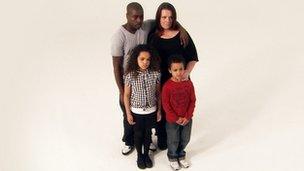Couples face child benefit quiz under new tax
- Published
- comments

Some couples may not be happy to swap tax and benefit details
New child benefit rules mean that some high earners and their partners will be expected to disclose their finances to each other from next January.
People will also be able to find out from HM Revenue and Customs if their partners receive child benefit, or earn above £50,000 a year.
The changes are part of the forthcoming taxation of child benefit in households where someone earns above £50,000.
Experts say the changes will breach key tax confidentiality principles.
"This is a chip away at independent taxation and taxpayer confidentiality, because there is no other way of going about it," said John Whiting, of the Chartered Institute of Taxation (CIOT).
Chas Roy-Chowdhury of the ACCA accountancy body said: "I think the Treasury have devised a bad tax that HMRC are having to implement.
"It is a bad idea to tax an individual who is not receiving the benefit."
Checking each other
The <link> <caption>new tax</caption> <url href="http://www.hmrc.gov.uk/budget2012/tiin-0620.pdf" platform="highweb"/> </link> starts on 7 January 2013 and will affect 1.2 million families.
It is going to be levied on those in a household whose "adjusted net income" is more than £50,000 a year and who claim, or whose partner claims, child benefit.
HMRC says it will "expect" couples to discuss their tax and benefits with each other, to find out if the higher earner is liable for the tax, despite the policy of separate taxation of married couples being in place since 1991.
HMRC will also let taxpayers ask for rudimentary information from its records to see whether or not their partners receive child benefit, or have an "adjusted net income" above £50,000, and should be paying the new tax.
This runs counter to the general principle of taxpayer confidentiality, which has been a formal part of the income tax system since 1803.
Revealing someone's tax records is currently a criminal offence for HMRC officials.
The relaxation of the two principles is going to happen because otherwise high earners who should pay the tax would be able to claim they were unable to find out if their partner received child benefit, and vice versa.
"In stable relationships you can see this carrying along smoothly," John Whiting said.
"But what about relationships that break up during the year?
"There are so many practical questions [about how the new tax will operate]," he added.
'Best of a bad job'
<link> <caption>Responsibility for paying the tax</caption> <url href="http://www.hmrc.gov.uk/budget2012/cb-income-tax.htm" platform="highweb"/> </link> will lie with the high earner in the household.
HMRC also administers the child benefit system, which pays out to nearly 7.9 million families, with 13.7 million children.
So the Revenue could cross-check its list of high earners with its list of child benefit recipients, to see where they coincide.
But it hopes that taxpayers who have to pay the tax will save it the trouble and identify themselves when they are sent forms, as part of an enlarged self-assessment tax system next year.
An HMRC spokeswoman explained how the Revenue expected the new arrangements to work.
"HMRC would expect couples to discuss their tax or benefit details with each other," she said.
"However, for taxpayers unable to discuss their financial affairs, we will develop a process with appropriate security checks so HMRC can provide 'yes/no' answers to simple questions about whether child benefit is paid to the taxpayer's partner or about the level of a partner's income," she added.
Despite the implications of the emerging policy, HMRC said: "We are committed to protecting the principle of individual taxation and confidentiality. These principles will be at the centre of our child benefit compliance procedures."
Chas Roy-Chowdhury said: "It is making the best of a bad job.
"The person paying has to comply with the system so there has to be a way they can get the information."
£700m saving
Currently, a parent can claim £20.20 a week in child benefit for their eldest or only child, and £13.40 for each subsequent child.
The money is not taxed and the system is geared towards paying the mother.
The payments apply to all children aged under 16 and in some cases until they are 20 years old.
The policy of withholding child benefit from families where there is a high earner was first suggested by the coalition government in 2010.
In this year's Budget the plan was refined so that it would not apply, as first suggested, to all those who pay 40% income tax on any of their incomes.
Instead, the tax will apply gradually at £50,000 of income, with the child benefit being eroded completely once someone's income is £60,000 or more.
It is expected to save the government nearly £700m a year.
If the high earner is also the person claiming child benefit for their children then they can simply stop claiming it in order to avoid the tax charge.
But if a parent with a high-earning partner claims the benefit, their partner will have no power to tell them to stop claiming it so the new charge can be avoided.
Penalties
The government estimates that 1.2 million families receiving child benefit will have to pay the new tax; 70% will lose all their benefit and the remaining 30% will lose just a portion.
The affected families are expected to lose £1,300 a year on average.
The Revenue said that if it suspected that individuals were not paying the new tax charge when they should, it would be able to cross-check its income tax records with its child benefits records.
"HMRC will apply existing risk assessment techniques to identify where, for example, income has been understated or the liability has not been reported," said the Revenue spokeswoman.
"Existing penalties will apply to non-compliant taxpayers," she pointed out.
That means fines or possible prosecution.